


Explore the top 5 documentation templates for developer guides that enhance productivity and streamline the documentation process.
Looking for the best documentation templates to create developer guides? Here's a quick rundown of the top 5 options:
- Swimm Continuous Documentation Templates
- The Good Docs Project Core Pack
- Document360 Knowledge Base Templates
- Docusaurus Documentation Platform
- ReadMe API Documentation Templates
Each template offers unique features to streamline your documentation process. Let's compare them:
| Template | Key Feature | Best For |
|---|---|---|
| Swimm | Code-coupled docs | Agile teams |
| Good Docs Project | Open-source toolkit | Community-driven projects |
| Document360 | Professional knowledge bases | Teams needing premium support |
| Docusaurus | React-based customization | React projects |
| ReadMe | API-focused templates | API documentation |
These templates can save you time, keep your docs consistent, and help you create clear, useful developer guides. Choose the one that best fits your team's needs and tech stack.
Related video from YouTube
Swimm Continuous Documentation Templates
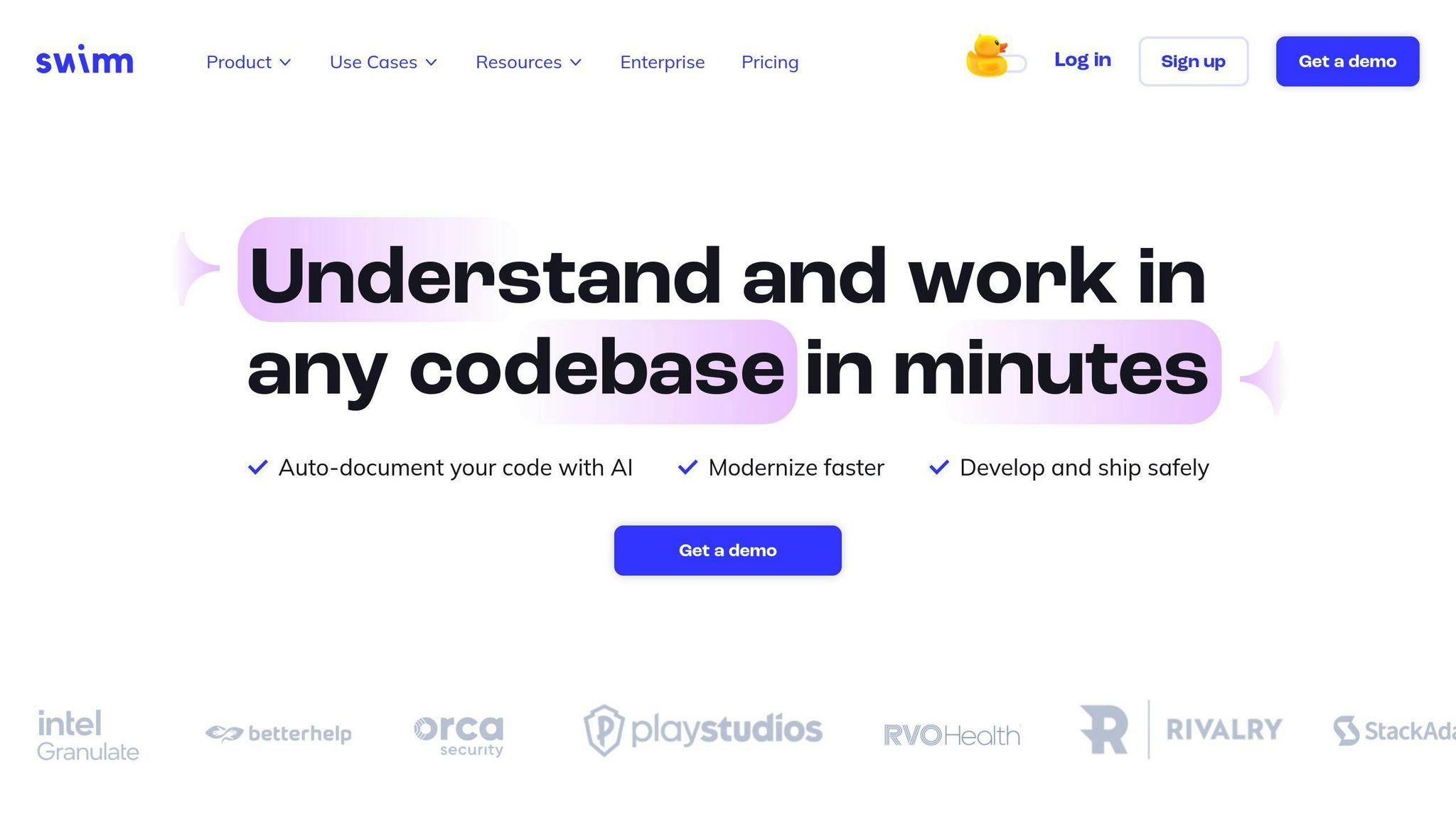
Swimm's platform offers templates to help devs create code-coupled docs fast. These templates live in your code repo, making them easy to access and maintain.
Here's what Swimm provides:
- How to Add a New User Configuration Value
- Adding an Instance of Component
- Testing Overview
- Dev Environment Setup
- Adding a new CLI Company in {Project Name}
- Incident Report
Each template guides you through the doc creation process. No more staring at a blank page!
Using Swimm's templates is simple:
- Create a new Swimm doc
- Pick a template
- Follow the prompts
- Open a PR or commit directly
Swimm's editor supports rich text, Markdown, and live code elements. This ties your docs closely to your codebase.
But here's the kicker: Swimm's Auto-sync. This AI algorithm updates code snippets automatically when your codebase changes. No manual updates needed!
"Swimm is basically the first true innovation in the last 10 years in the knowledge management and documentation space." - A.J. Williams, Associate Director of Engineering Recursion
Swimm also plays nice with VS Code and IntelliJ. Access docs right in your IDE. Less context switching, more coding.
Moving to Swimm? No problem. You can import from Notion and Confluence.
Check out Swimm's impact:
| Benefit | Impact |
|---|---|
| Onboarding time reduction | ~55% |
| Productivity boost | ~50% |
"Swimm is a tool that we don't know how we ever lived without. Accessible information improved productivity and made transferring knowledge between engineers frictionless." - Ryan McKenna, Staff Engineer at RVO Health
2. The Good Docs Project Core Pack
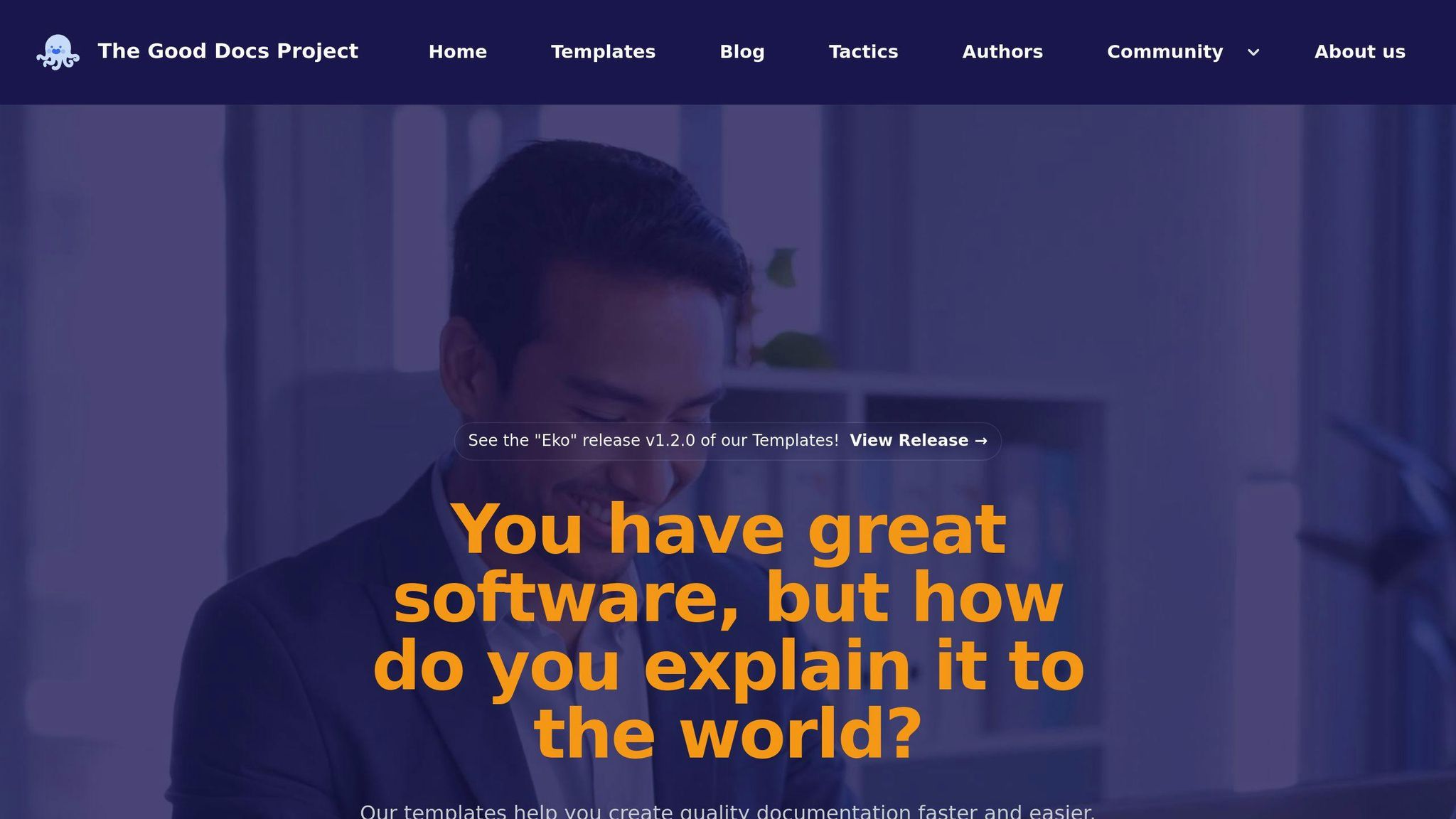
The Good Docs Project Core Pack is your ticket to creating killer documentation. It's an open-source toolkit packed with templates for all your software doc needs.
Here's what you get:
| Template | What it's for |
|---|---|
| Concept | Explain features and context |
| How-to | Step-by-step instructions |
| README | Project overview and quick start |
| Reference | In-depth topic details |
| Release notes | Update and change info |
| Troubleshooting | Common issues and fixes |
| Tutorial | Hands-on learning guide |
Each template comes with a guide, resources, and an example. It's like a documentation starter pack.
Why bother? Good docs help users get your product FAST. And let's face it, documentation often sucks. A 2017 GitHub survey found 93% of people saw incomplete or outdated docs in open-source projects.
Ready to level up your docs?
- Grab the templates from The Good Docs Project site
- Pick the right template for your needs
- Follow the guide to fill it out
- Tweak it to fit your project
"The Good Docs Project was born because we wanted to create templates and best practices for open source technical documentation." - Ankita Tripathi, Technical Writer and Community Manager
Don't let your docs be an afterthought. Use these templates and watch your users (and team) thank you.
3. Document360 Knowledge Base Templates
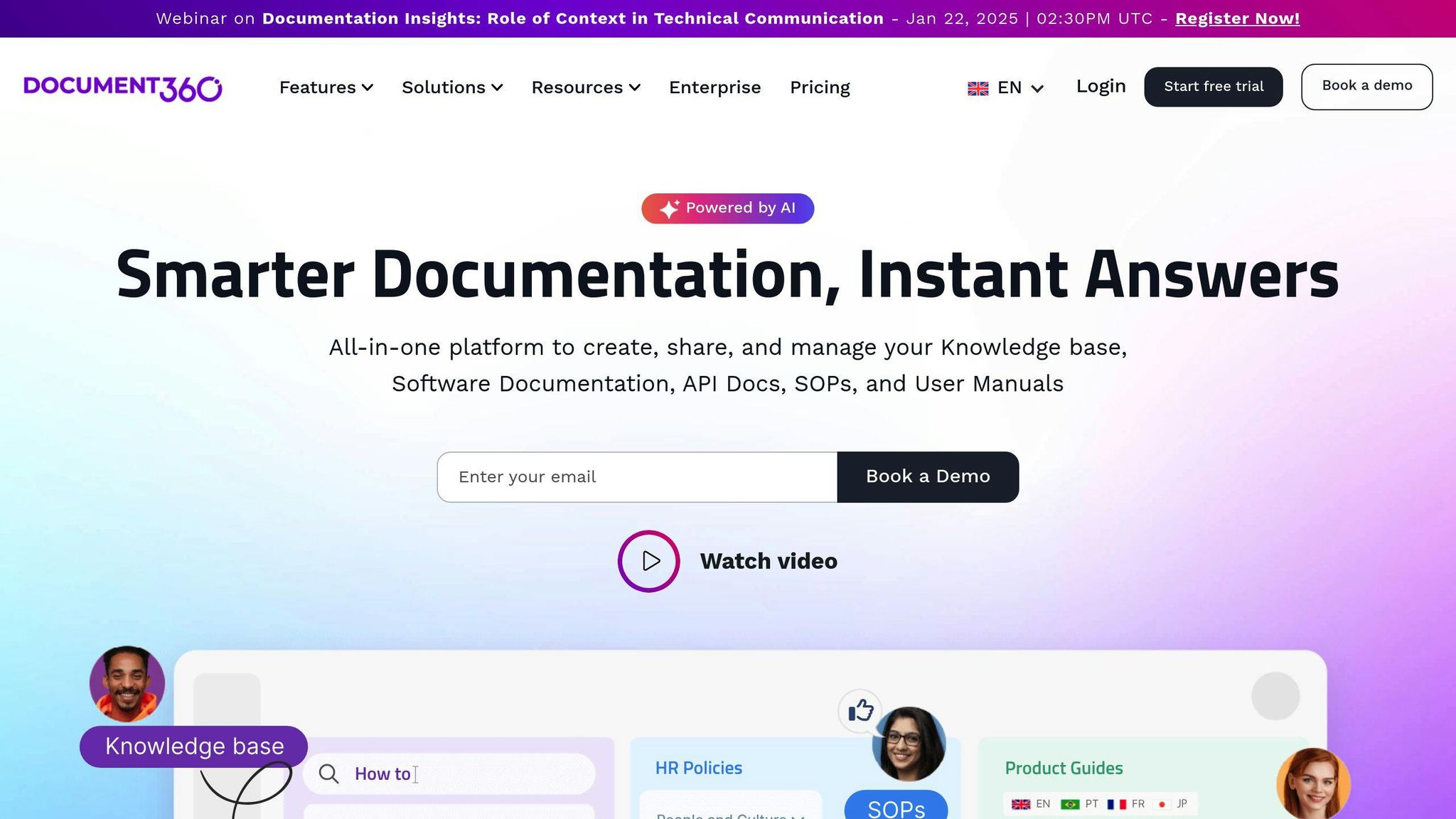
Document360 offers templates to help developers create professional knowledge bases fast. These templates cover various document types:
| Template Type | Use Case |
|---|---|
| User Guides | How-to instructions |
| FAQs | Q&A sections |
| Release Notes | Version updates |
| Custom Docs | Specific needs |
You can use system templates or make your own. This keeps your docs consistent and saves time.
To use Document360 templates:
- Pick a system template
- Make a new template
- Save an article as a template
Customize your chosen template to fit your project. This keeps your knowledge base looking sharp.
Why use Document360 templates?
- They're quick
- They look professional
- You can tweak them
Document360 also offers:
- Content organization
- Powerful search
- User engagement tracking
These features help you make better docs. For example, you can see which parts of your docs are popular and focus on those.
Document360 users report cutting support requests by HALF with a good knowledge base.
Unlike Confluence, which is for team communication, Document360 is all about documentation.
Pricing starts at $199/month for small teams. There's a free plan to try it out.
sbb-itb-bfaad5b
4. Docusaurus Documentation Platform
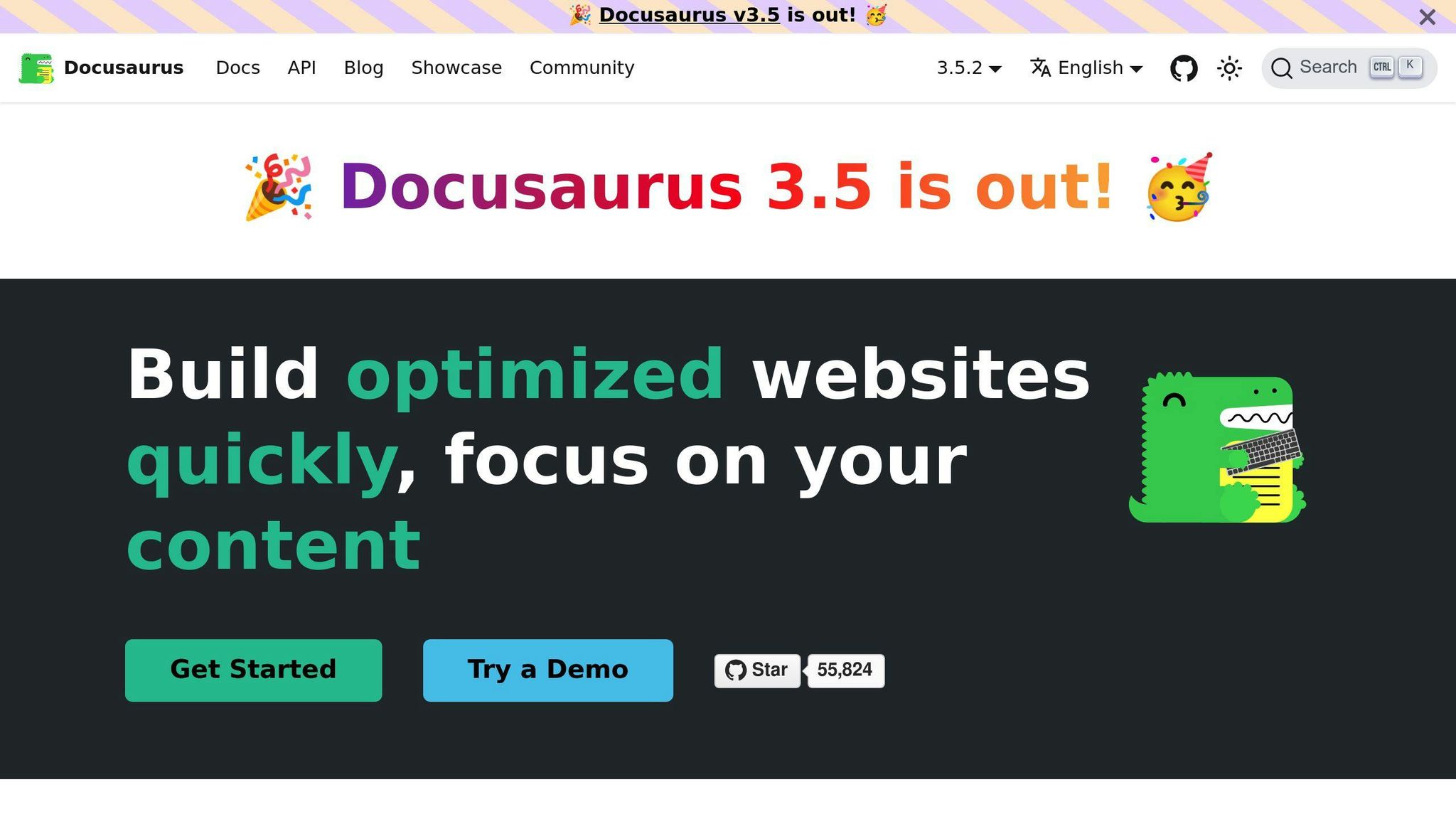
Docusaurus is Meta's open-source tool for building doc websites. It uses React and Markdown, perfect for devs who want standard docs and interactive content.
Here's what Docusaurus offers:
- Versioning and internationalization
- React-based customization
- Markdown and MDX support
- Dark and light themes
Start a new project:
npx @docusaurus/init@next init my-website classic
This creates a site with:
| Folder | Purpose |
|---|---|
| blog | Blog posts |
| docs | Documentation files |
| src | Custom pages and CSS |
| static | Images and assets |
Big names using Docusaurus? Algolia, Redis Labs, and React Native.
Customizing your site:
1. Edit docusaurus.config.js for title, tagline, and favicon
2. Update sidebars.js for doc structure
3. Add Markdown files to docs folder
Docusaurus generates a static React site. Host it on GitHub Pages, Netlify, or wherever you like. It's your call, but remember: hosting might cost you.
How does it stack up?
| Feature | Docusaurus | GitBook | MkDocs |
|---|---|---|---|
| Base Tech | React | JavaScript | Python |
| Customization | High | Moderate | Moderate |
| Versioning | Built-in | Limited | Plugin |
| Search | Built-in | Built-in | Plugin |
Docusaurus shines with its React base and customization options. If you're already in the React world, it's a no-brainer.
5. ReadMe API Documentation Templates
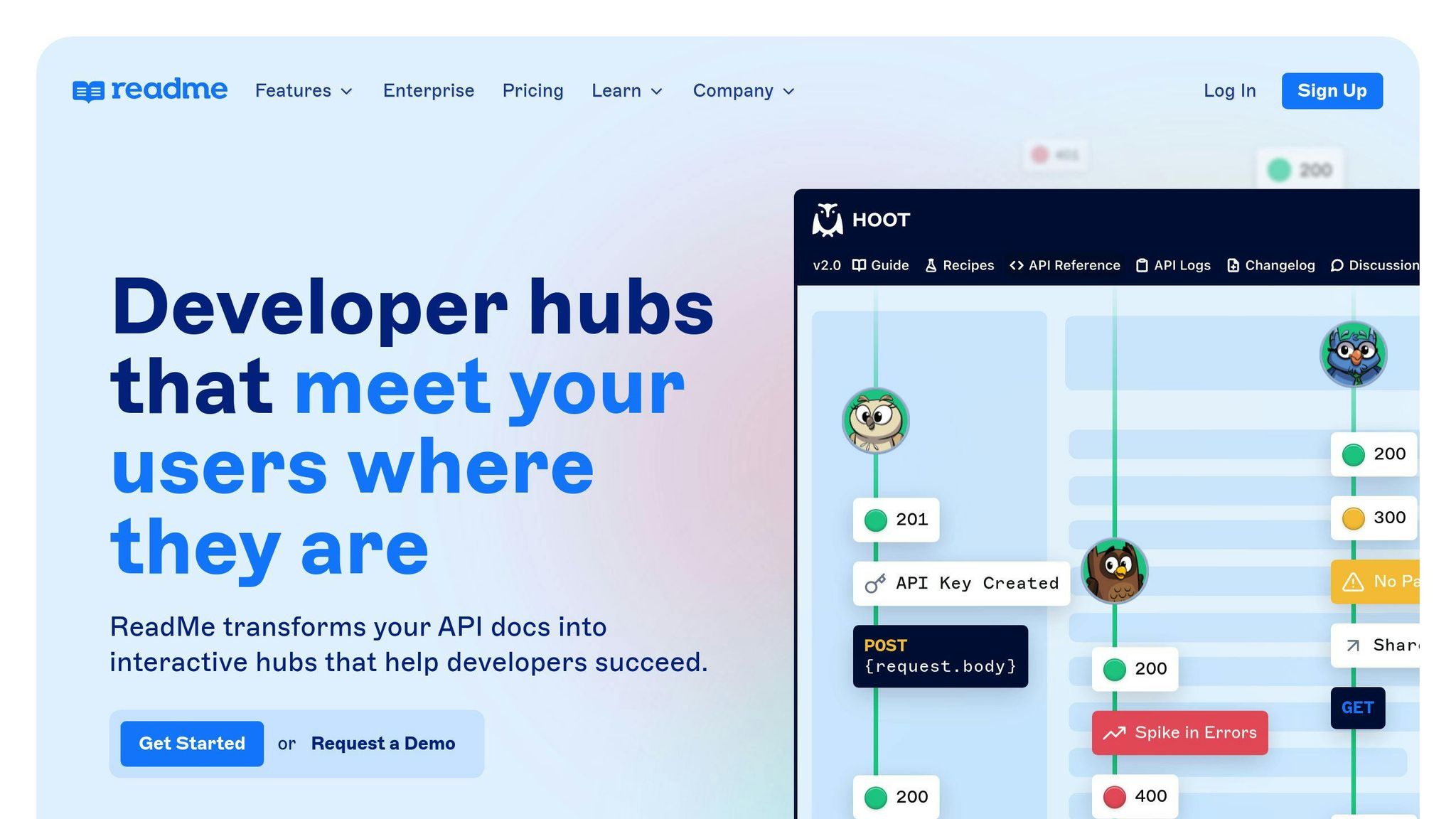
ReadMe's templates make API docs a breeze. They cover the essentials: API references, guides, and changelogs. Let's break it down:
API Reference template:
- Lists endpoints and parameters
- Imports OpenAPI files or use manual editor
- Includes "Try It" playground for live testing
Guide template for how-tos:
- Getting started pages
- Authentication details
- Tips and tutorials
Changelog template for updates (with RSS feeds)
ReadMe's templates come with some cool features:
| Feature | What it does |
|---|---|
| Global Navigation | Quick access to doc sections |
| Sidebar Navigation | Content overview |
| Search | Find info fast |
| Interactive Elements | Code samples, tables, images |
These work together to make your docs look pro and easy to use.
Want to customize? You can:
- Use custom CSS and JavaScript
- Create reusable content blocks
- Integrate with tools like Slack
But heads up:
- New editor has fewer formatting options
- Can't upload project files to the portal
Pricing? There's a free tier with basic features. Paid plans start at $99/month.
Big names like Clover and UiPath use ReadMe. It works for small and large projects alike.
Template Comparison
Let's compare five documentation templates based on key factors:
| Template | Dev Tool Integration | Customization | User Support | Ease of Use |
|---|---|---|---|---|
| Swimm | Seamless | High | Limited | Moderate |
| Good Docs Project | Moderate | High | Community | High |
| Document360 | Good | Moderate | Premium | High |
| Docusaurus | Excellent | High | Community | Moderate |
| ReadMe | Good | Moderate | Basic/Premium | High |
Swimm works great with dev tools, perfect for Agile teams. It's highly customizable but might challenge beginners.
The Good Docs Project is user-friendly and customizable. But its community support might not cut it for everyone.
Document360 strikes a balance. It offers premium support but fewer customization options.
Docusaurus is a React powerhouse. It's customizable but might be tricky for React newbies.
ReadMe's API docs are easy to use and integrate well with dev tools. Support varies based on your plan.
Your choice depends on your team's needs. Using React? Try Docusaurus. Need lots of support? Document360 might be your best bet.
Think about your project size too. Small teams might love ReadMe's simplicity, while bigger orgs could benefit from Swimm or Docusaurus.
And don't forget about updates. If your project changes often, Swimm's continuous documentation approach could save you time.
Wrap-up
Documentation templates are a developer's best friend. They cut down on work, keep things consistent, and make guide-writing a snap. Let's recap the five templates we looked at:
- Swimm: Great for Agile teams
- The Good Docs Project: Community-driven and solid
- Document360: Easy to use with good support
- Docusaurus: Perfect for React projects
- ReadMe: Streamlines API docs
Choose a template that fits your team. Think about how it works with your dev tools, how much you can customize it, and what kind of support you'll get.
"Documentation is a big deal for software projects. But many projects don't have enough docs to help users." - Eric Holscher, Write the Docs co-founder
Don't let your project fall short. Use these templates to create clear, useful developer guides. Your team (and future you) will be glad you did.

.png)








